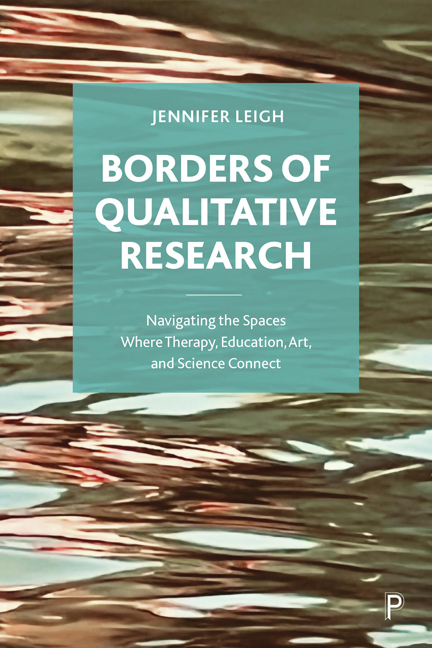 Borders of Qualitative Research
Borders of Qualitative Research Published online by Cambridge University Press: 28 March 2024
Research, particularly research with the self or with people, presents many challenges and constraints. However, often the only mention of these and potential implications is within a formal university ethics approvals process. The requirements of these varies between institutions. Ethical processes are, for the most part, based around medical or clinical research. They are primarily designed to protect institutions from risk (Dingwall 2016), and do not take into account the same safeguarding elements as professional ethics (Hayes 2009). A real-world approach that shifts ethics from ‘do no harm’ towards a social justice perspective is advocated by Helen Kara (2018). She encourages reflexivity even in quantitative researchers to recognise and acknowledge positionality and bias, and a move from the view that science equals objectivity. Kara argued that researchers need a broader view of ethics, and should think of axiology instead as a ‘wider term than ethics’ (Kara 2018: 14). Axiology is a branch of philosophy that incorporates religion, aesthetics, ethics, and how these play a role in the construction of knowledge. Axiology implies the researcher adheres to values such as respect, reciprocity, and relational accountability (Wilson 2008). This in turn means they should be aware of how the research methods they choose can help or hinder the building of respectful relationships, and privilege some stories over others. Conventional Euro-Western research is non-egalitarian, with the researcher holding the power and making all decisions about what and who are researched, the methods used, and how data are analysed and disseminated. Research is done to or on a topic and participants are research subjects. The research is owned by the researcher, and they have control of it. Creative or arts-based, participatory, and embodied research can all challenge assumptions about participants in research and ethics processes with regard to ownership of co-created content, anonymity, and autonomy. Participants may not want anonymity, and might ask for their names or faces to be associated with their stories. They may want to choose which of their stories are shared, how they are presented, and who they are shared with. Research in these paradigms is with people not on them. Data are generated, co-constructed, or co-created, which means a consideration of ethics and axiology needs to continue beyond research design and data gathering, including reflexivity through analysis and dissemination (Kara 2018).
To save this book to your Kindle, first ensure no-reply@cambridge.org is added to your Approved Personal Document E-mail List under your Personal Document Settings on the Manage Your Content and Devices page of your Amazon account. Then enter the ‘name’ part of your Kindle email address below. Find out more about saving to your Kindle.
Note you can select to save to either the @free.kindle.com or @kindle.com variations. ‘@free.kindle.com’ emails are free but can only be saved to your device when it is connected to wi-fi. ‘@kindle.com’ emails can be delivered even when you are not connected to wi-fi, but note that service fees apply.
Find out more about the Kindle Personal Document Service.
To save content items to your account, please confirm that you agree to abide by our usage policies. If this is the first time you use this feature, you will be asked to authorise Cambridge Core to connect with your account. Find out more about saving content to Dropbox.
To save content items to your account, please confirm that you agree to abide by our usage policies. If this is the first time you use this feature, you will be asked to authorise Cambridge Core to connect with your account. Find out more about saving content to Google Drive.